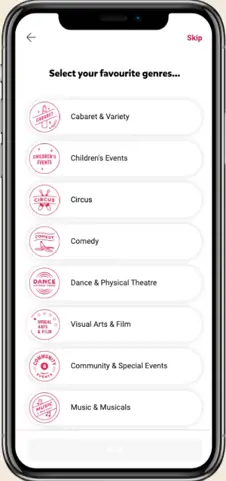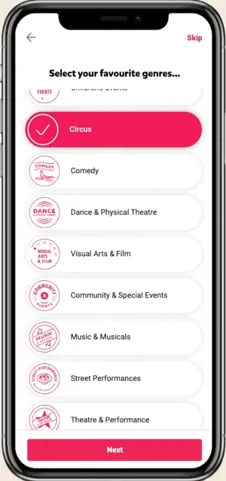Why digital personalisation matters

Tailoring content and functionality to a user's needs, can improve performance by driving sales, increasing brand loyalty, and improving engagement.
Today, more than ever, organisations are striving to improve website and app performance by enhancing a user's experience, giving them what they need and delivering it to them when they need it. This is known as digital personalisation.
Key Takeaways
- Despite the benefits, only a small percentage of websites have an active personalisation strategy
- To implement a successful personalisation strategy, businesses need to understand their users
A 2020 report surveyed organisations about the importance they placed on a personalised user experience, revealing that 97% of marketers who implement personalisation see a measurable lift in the performance of their digital assets.
Interestingly, whilst these results are compelling, only 57% of desktop websites and 28% of mobile websites currently have an active personalisation strategy implemented.
The key reason many organisations are lagging in adopting digital personalisation is that many businesses actually do not possess a thorough enough understanding of their customers to implement an effective strategy.
More on that shortly, but first, what are the opportunities in personalisation, and who's doing it well?
Personalisation, as you would expect, enables us to deliver content and functionality that is tailored to an identified user's need or interest.
The ability to serve this targeted information relies on a technical platform or system to perform the actions required to tailor the experience within a website or app.
Whilst technology can provide amazing power, it relies on the journey planning research that defines and maps the users you are targeting for a personalised experience. There are extensive tools available to assist, however, it currently remains a process of research, mapping and data analysis.
Why personalisation matters
There are many ways improving user experience through personalisation has the potential to improve performance.
Driving sales
Unsurprisingly, users are more likely to convert when they feel like the organisation genuinely understands their needs. Benefits such as increased conversion rates, improved customer experience ratings and an increase in visitor engagement are all regularly reported.
Amazon is perhaps the highest profile example of the effect personalising a user’s experience can have on improving sales performance. By personalising the user's dashboard and email with product recommendations based on product history, the user is more predisposed to further purchases because they are presented with products they are genuinely interested in. It's a simple case of ensuring the right message targets the right audience.
Greater brand loyalty
Research has shown 96% of respondents agree that personalisation helps advance and strengthen customer relationships because of the perception of message authenticity. When an experience feels real, it inspires an emotion-based response, which supports a sense of intrinsic trust towards a brand, meaning the user is more predisposed to loyalty and more likely to become a brand advocate.
96% of respondents agree that personalisation helps advance and strengthen customer relationships
Spotify's "Discover Weekly" feature builds a curated playlist of tracks based on a user's 'taste profile' that it develops by monitoring their listening behaviour, as well as the most popular playlists amongst similar users across the entire Spotify audience.
By using this feature, I was able to discover a ton of songs that have now been added to my favourites playlist. For a company that deals with content as emotional as music, leveraging personalisation tools is a powerful way to develop an emotional connection with users.
Better engagement
Personalisation can help users discover content and increase efficiency when it comes to completing tasks within a website or app.
When a user feels like they are being swamped with irrelevant content and options, unsurprisingly they become frustrated and disengaged.
Understanding what the user might be interested in at a particular time, means they are more likely to engage with the website/app.Youtube increases user engagement by leveraging Artificial Intelligence to personalise the user's dashboard feed. For example, their AI algorithm is able to determine what types of videos you are more likely to watch on your mobile and then feed you recommendations while browsing Youtube on your phone.
First things first
In order to implement a successful personalisation strategy, you need to understand your users by identifying their needs, the problems they are looking to solve, the times they using the website or app, and also how they use it?
By clearly defining your users, you'll be able to better target specific segmented groups with content tailored to their needs.
The more defined your user groups are, the more authentic the experience will feel, so it's essential to conduct proper user research to gain that understanding.
Digital Personalisation in Action
Digital personalisation is a big part of a number of projects we’ve delivered here at equ. As part of the development of a world-leading festival mobile app for FringeWorld, we put a large focus on personalization, matching users with shows relevant to their persona, location and interests.
To do this, we created an intuitive step-by-step onboarding process that allowed users to select their interests. Based on their preferences, the app instantly surfaced shows matching their preferences.



We also discovered during our research that festival-goers often see multiple shows in one night when visiting a FringeWorld hub. We introduced a feature that displayed events that were near to the user, allowing them to make spur-of-the-moment purchases at the Festival itself.
Read how the personalised customer experience generated more than $1.45 million in ticket sales for Fringe World.
The future of digital personalisation will undoubtedly begin to leverage the power of Artificial Intelligence and Machine Learning, giving infinitely more power to uncover deeper insights into your user's behaviour.
That technology may seem out of reach to the average business right now, but it's coming. And when it does, organisations that have already implemented a personalisation strategy will be in the driver's seat to create the ultimate personalised user experience and reap the rewards.



